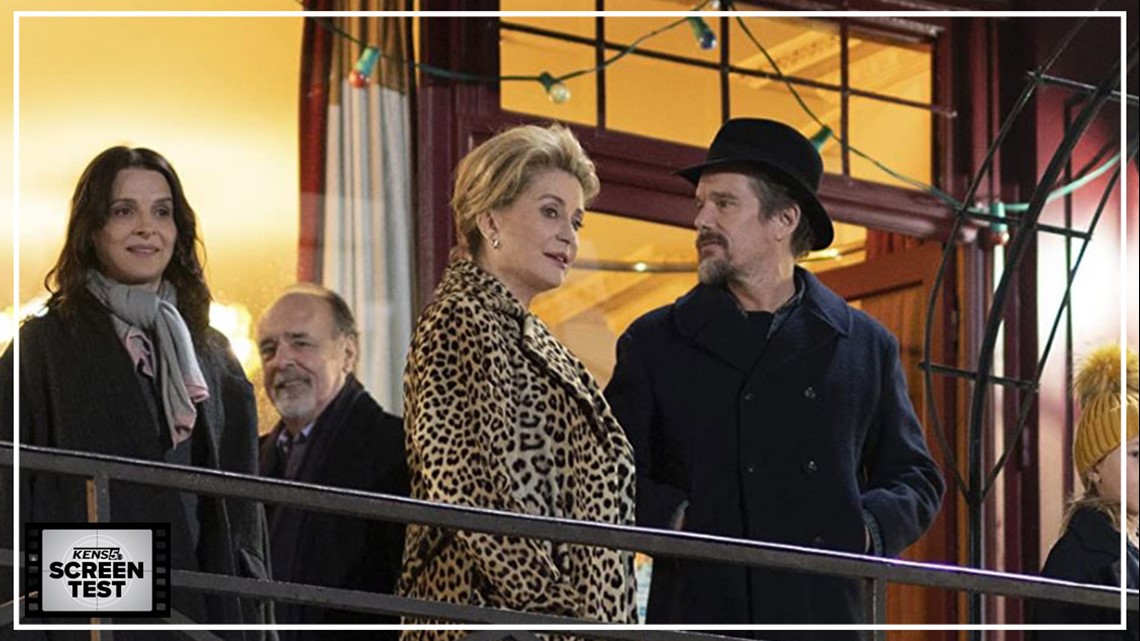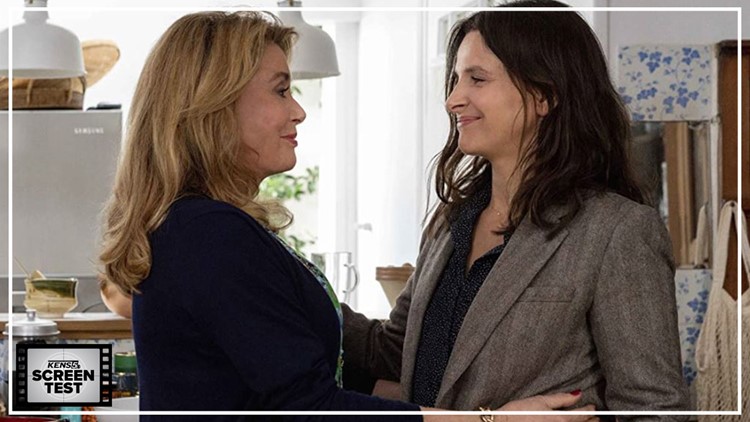In Hirokazu Kore-eda’s new fraught-family drama, “The Truth,” a matriarch makes the decision to blast off into space so that she may never grow old, paving the road for an inevitable reckoning on emotional isolation when her daughter eventually comes to visit, having grown much older than she has remained.
Don’t worry, you’re reading the right review. While Kore-eda tends to keep his characters rooted firmly (physically, if not spiritually) to solid ground, “The Truth” – the filmmaker’s follow-up to the Palme d’Or-winning “Shoplifters,” and his first non-Japanese project – keys up a movie-within-a-movie concept to build a narrative nesting doll of mother-daughter relationships, effectively setting up the selective storytelling nature of filmmaking as a refraction point for the hashing out of real-world familial arguments stemming from murky personal histories.
The movie is as emotionally ambitious as it sounds. And against the backdrop of a style of filmmaking that can feel layman until it’s suddenly as lustrous as briefly gazing up into the cosmic infinite, “The Truth’s” central metaphor mostly pulls it off, especially as an observation of people whose stories are tied to the fake lives and tales of the movies. But there’s also an overabundance of characters, perspectives and tangents in the folds of Kore-eda’s latest, resulting in a tangle of unrefined arcs and an overall story that struggles to compromise between the overlap of interpersonal journeys and obvious destinations.
In a stroke of meta storytelling blurring the boundaries between our loyalty to celebrity in reality and to depictions of celebrity in fiction, it’s the legendary French actress Catherine Deneuve who Kore-eda calls upon as the catalyst for our self-interrogation. As Fabienne Dangeville, Deneuve speaks dismissively and carries a big ego, imbuing the character with the slightest hint of self-doubt as she navigates the set of the aforementioned sci-fi drama a way that lets everyone know they’re lucky to be in her presence. It’s easy to be swallowed up by the fact that Fabienne seems to be as well-regarded as the actress playing her; not many people will confront her (you get the sense she’s earned that right) and fewer will question what she means to the industry of French cinema. What she says – and what she represents – is taken as fact.
But fact and fiction are notorious bedfellows in “The Truth.” Our initial impression of Fabienne is shaped by necessary clues – her massive house, the air of accomplishment – and Kore-eda’s screenplay emphasizes implied pasts that are just as easily accepted as they are ripe for scrutiny, given we’re not privy to flashbacks. We stay firmly in the present, on the eve of the release of Fabienne’s new autobiography, the facts of which are debated by Fabienne’s daughter, Lumir (Juliette Binoche, as good as ever), upon a visit to Paris; if we didn’t know any better, we’d think Lumir expected fabrication in her mother’s memoirs, given the timing of her visit with her American husband, Hank (Ethan Hawke), and their young daughter, Charlotte (Clementine Grenier). Lumir confronts Fabienne about the alleged warping of stories from her childhood with her mother, and about the failure to mention a mysterious “Sarah,” to which Fabienne responds: “My memories, my book. I can pick and choose, can’t I?”
Well, can she? That question drives the drama in “The Truth,” a movie that Kore-eda directs with breezy, light-hearted whimsy even as he digs deep into the implications of a screen legend’s self-mythologization on her innermost circle—those who know her beyond the screen and magazine cover story. Lumir seeks closure on the way she remembers being neglected in her upbringing by Fabienne, but memory proves to be a fickle thing for both women—further complicating increasingly heated arguments between them that slowly become less about what needs to be done right upon and more about who needs to do right by whom. “You can’t trust memory,” Fabienne says out loud, more than once, as if she’s starting to be her own messenger.
“The Truth” is a mostly straightforward picture in the tradition of dramedy that has a pep in its step and familiar lessons to impart about reconciliation and forgiveness, even as you get the sense Kore-eda is itching to make the proceedings a bit toothier than they are. A touch of the surreal gives texture to the filmmaker’s deft direction, although this is a much more talkative story than we’re used to seeing from him. Hints about pasts are borne out in interviews, arguments and confessions taking place in the present, and Kore-eda leaves it up to us to connect the dots where they are meant to be connected.


But “The Truth’s” gaze is wider than Fabienne and Lumir. Hank, himself an aspiring actor, and Charlotte, equally curious and shy, each come with their own set of preconceptions about a woman they know less as a family member and more as an accomplished actress. And although Kore-eda doesn’t write these relationships with as much nuance as the fractured bond at the movie’s center, they serve as effective devices for Lumir to interrogate her own recollections when she’s taking a break from interrogating her mother’s.
And then (speaking of mothers) there’s the layers of subtext added via the sci-fi movie Fabienne has been cast in, the title of which, “Memories of My Mother,” should ease any worry that Kore-ada’s narrative will take obtuse turns. While most of “The Truth” takes place in Fabienne’s sprawling home, the scenes on the set of her new film are key in unlocking the catharsis that Kore-eda is slowly and surely maneuvering toward. “The Truth” may be as sentimental and warm and accessible as anything the filmmaker has done, but I was most engaged with the subtler elements of the parallel stories at the movie’s core—both are works of fiction (from our own perspective, that is), but where “Memories of My Mother,” as with all movies, represents the curation of specific moods and intentions by its director, Fabienne’s story is of her own making.
And Deneuve is so wonderfully good at conveying feigned confidence about the authorship of Fabienne’s narrative, while also suggesting – through her inquisitive eyes that are looking inward as they look on her family – a soul not quite at peace with her own evolution. Her performance – especially whenever she’s matched with Binoche – is the skeleton key to the movie’s heart. The beat is true to life and the pulse is steady, even if its myriad arteries makes it feel like Kore-eda takes some detours en route to his soft landing of a denouement.
"The Truth" is rated PG for thematic and suggestive elements, and for smoking and brief language. It's available to rent on digital platforms Friday.
Starring: Catherine Deneuve, Juliette Binoche, Ethan Hawke, Clementine Grenier
Directed by Hirokazu Kore-eda
2020
OTHER SCREEN TEST REVIEWS
- ‘Eurovision Song Contest’ Review: Overlong Will Ferrell-Rachel McAdams comedy is enjoyable when it leans into the outrageous
- The best movies from the first half of 2020
- ‘My Spy’ Review: Dave Bautista’s talents are wasted in uninspired genre mashup
- ‘House of Hummingbird’ Review: Tender South Korean drama finds empathy in harrowing moments of teenagerdom
- 'Shirley' Review: Elisabeth Moss powers bewitching psychological drama about an author and her muse
- 'Babyteeth' Review: Familiar coming-of-age narrative is given reinvigorating new life in Shannon Murphy's directorial debut
- ‘7500’ Review: Joseph Gordon-Levitt stars in high-altitude thriller whose thrills succumb to narrative weightlessness
- 'The King of Staten Island' Review: Judd Apatow-Pete Davidson collaboration is a hilarious jaunt that can get lost in its sentimentality



